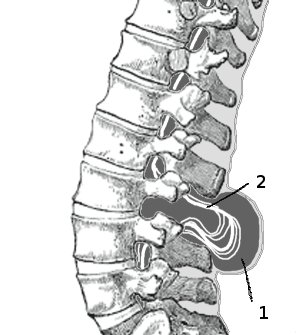The spine is a column of connected bones, called vertebrae, which protect a strand of delicate neural tissue running through the apertures of the spine, called neural foramina. Each vertebra is bolstered by a cushiony layer called a disc, which absorbs shocks and assists in fluid movement of the spine. Spinal cord injury occurs when the strength of the discs is compromised, throwing the vertebrae out of alignment and bruising, crushing, or otherwise damaging the neural tissue encased in the foramina.
Captivating as these human biological terms may be, they’re not terribly useful on a practical level. Knowing what happens in a spinal cord injury is interesting, but may not be helpful to those concerned about preventing or seeking treatment for spinal cord injuries. Some other pertinent questions to ask would be, “What forces cause the spine to curve, stretch, or fracture to an extent that causes injury?” and “How and in what contexts are these forces typically exerted?” When do spinal cord injuries arise, and can they be prevented?
It is generally agreed that spinal cord injuries occur most often in 5 sets of circumstances—auto accidents, slips and falls, assaults, athletic injuries, and certain illnesses. For more details on the factors that influence the incidence and severity of spinal cord injuries, read on:
Table of Contents
1. Auto accidents
There are many avenues to spinal cord injury in an auto accident—a sudden change in velocity alone can cause whiplash or a similar injury; and sudden hard impact can do even worse harm. Even if the spine is not actually bent or broken by contact with an external object, the force of speed by itself put enormous pressure on the vertebrae or even push them out of place. Even when there is no immediate pain following an auto accident, spinal cord injury should not be automatically ruled out.
2. Slips and falls
Like auto accidents, many slips and falls culminate in an abrupt halt. Sometimes the victim of a slip and fall injury may land against a chair or some other object that places disproportionate stress on one point in the spine; at other times, as when a person falls flat on their back, the injury may be caused by a quick, hard landing. In any case, a slip and fall injury that results in acute or prolonged back pain should be examined by a medical professional.
3. Assault
Violently inflicted spinal cord injuries are not just an exaggerated punishment some muscle-bound supervillain inflicts on Batman; they are unfortunately quite possible in the realm outside of Gotham. In fact, violence is among the top causes of spinal cord injury. Should you ever find yourself subjected to a physical beating, that person may be accountable to pay your damages, as well as their debt to society if the violent act was more than merely reckless.
4. Athletic injuries
There’s a reason why athletes are told to stretch and warm up extensively before beginning practice—the body is more vulnerable to injury if its muscles, ligaments, etc. have not been properly primed for their activity. The spinal cord is particularly likely to sustain an injury if it has not been prepared for the twisting, craning, etc. it will undergo throughout the course of an exercise session. In addition, falls and sudden impacts are more likely in a sporting environment. Special care should be taken before, during, and after athletic exertion to ensure that the spine does not suffer lasting harm.
5. Illness
Diseases that affect the ligaments and/or skeletal system can be detrimental to the spinal cord, as well. Arthritis, osteoporosis, and cancer can cause swelling and inflammation in the vicinity of the spinal cord and expand into the spinal cord, itself. Individuals suffering from such ailments should ask their health care provider about the possibility that their condition has or might lead to a spinal cord injury.
While many spinal cord injuries are the outcome of tragic blunders or genetic predisposition, others follow preventable accidents caused by inexcusable oversights. In such cases, the victims of spinal cord injury are owed compensation by the one responsible for it—the owner or proprietor of a property or any person conducting themselves irresponsibly in a public space. If you think you or a loved one may fit the bill for a victim of negligence and would like to explore your options for seeking compensation, don’t wait for your condition to worsen: Call personal injury attorneys Good Guys Injury Law at (801) 506-0800 for a free consultation.
Image courtesy of: Wikimedia Commons user Uvainio
